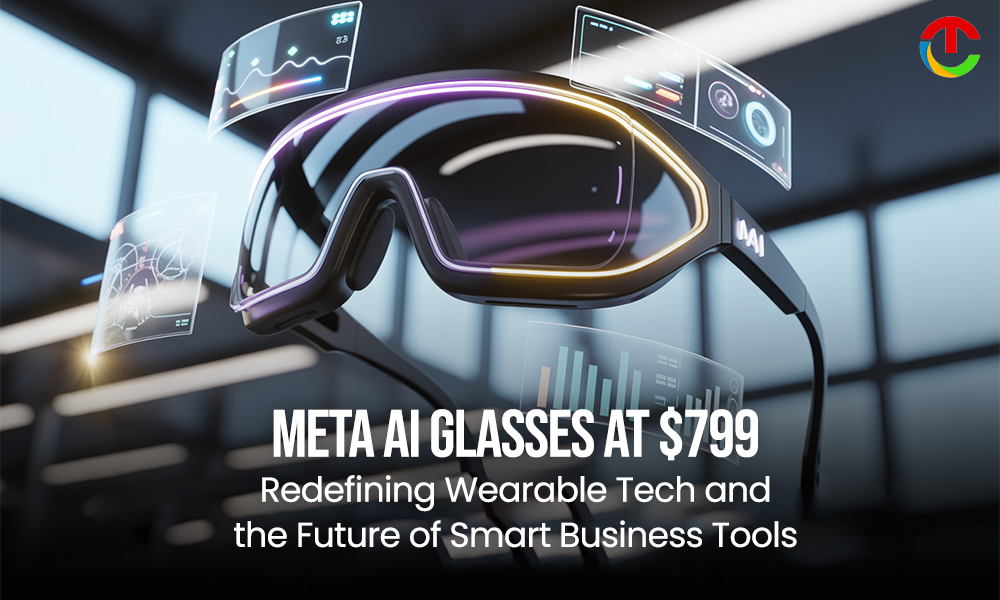Technology has surely entered our lifestyle significantly, and how! With wearable devices becoming more and more popular, there’s a lot of buzz around the newly launched meta smart glasses that have disrupted the way people will see from now. Priced at $799, it has marked a defining moment in the sector of augmented reality and artificial intelligence. Targeting everyday users, professionals, and enterprises, this consumer gadget has taken the tech sector to newer heights. It is a disruptive move by Mark Zuckerberg to bring in ease in the quality of life of people.
A New Era of Wearable Technology
For years, smart wearables have been associated with fitness trackers, smartwatches, and VR headsets. However, the introduction of AI-enabled eyewear represents a leap forward. Unlike earlier iterations of smart glasses that struggled with utility and adoption, the latest release integrates seamlessly with both digital and real-world environments.
By combining AI-powered features with a sleek design, Meta smart glasses are moving beyond novelty. They promise real-time translation, contextual information overlays, voice-activated productivity tools, and even AI-driven assistance for tasks like scheduling or document drafting. These innovations elevate the product from a luxury gadget to a business productivity enhancer.
The Price Point and Value Proposition
At $799, these meta smart glasses are positioned as a premium product. While the cost may appear steep compared to entry-level wearables, the price reflects the advanced hardware and AI capabilities embedded in the device. For businesses and professionals, the investment could translate into significant value, particularly in industries where real-time information, efficiency, and communication are critical.
For example, sales teams could leverage the glasses for on-the-go client presentations, healthcare professionals might use them for patient data visualization, and logistics managers could monitor supply chains in real time. The $799 price tag is less about luxury and more about positioning the device as a strategic business tool.
Redefining the Workplace
The integration of AI into wearable devices has far-reaching implications for the workplace. Meta smart glasses can serve as virtual assistants, capable of handling voice commands, retrieving data instantly, or generating reports on the spot. By reducing reliance on laptops or smartphones, employees gain hands-free productivity, a significant advantage in fast-paced environments.
In hybrid and remote work settings, the glasses could enable immersive collaboration, allowing colleagues to interact with digital content in real-world contexts. Virtual whiteboarding sessions, shared augmented environments, and instant transcription of meetings are just a few examples of how this innovation can transform communication.
Competitive Edge in the Business Tech Landscape
As competition in the wearable space intensifies, Meta’s latest move underscores its ambition to dominate beyond social media. The focus is not just consumer entertainment but also enterprise adoption. Companies investing early in tools like Meta smart glasses can gain a competitive edge by streamlining workflows, enhancing employee engagement, and modernizing customer experiences.
Moreover, industries such as manufacturing, logistics, healthcare, and education stand to benefit significantly. In manufacturing, workers could access repair manuals without interrupting their tasks. In education, interactive lessons could be delivered directly into the learner’s field of view. The versatility of the device makes it a potential game-changer across sectors.
Balancing Privacy and Innovation
With every technological leap, concerns about privacy and data security follow. Glasses equipped with AI and camera functionalities raise questions about surveillance, data usage, and ethical implementation. To maintain trust, Meta must prioritize transparency, data protection, and user control. Businesses adopting the technology will also need clear policies to ensure compliance with legal and ethical standards.
By striking the right balance between innovation and responsibility, Meta’s smart glasses can avoid the pitfalls of earlier wearable attempts that failed due to privacy backlash. Clear communication and robust safeguards will be crucial to widespread adoption.
Looking Ahead: The Future of Business Tools
Wearable technology is no longer confined to personal convenience; it is redefining the future of business tools. As AI continues to mature, professionals will increasingly demand devices that blend efficiency, connectivity, and intelligence.
The $799 glasses are just the beginning. Over time, costs may decline, features will expand, and integration with enterprise ecosystems will become seamless. Just as smartphones evolved into indispensable business assets, Meta smart glasses could follow the same trajectory, transitioning from a high-end innovation to a mainstream productivity standard.
Conclusion
The launch of Meta smart glasses highlights a turning point in the convergence of AI, wearables, and professional tools. At $799, they represent more than just a tech accessory; they embody a new vision for the future of work and connectivity. By enabling hands-free productivity, immersive collaboration, and real-time data access, they are reshaping how individuals and organizations engage with technology.
As businesses explore new ways to innovate and stay competitive, these glasses offer a glimpse into a future where smart wearables are not optional but essential. The redefinition of wearable technology has begun, and the next chapter promises to change how we work, connect,and create.




